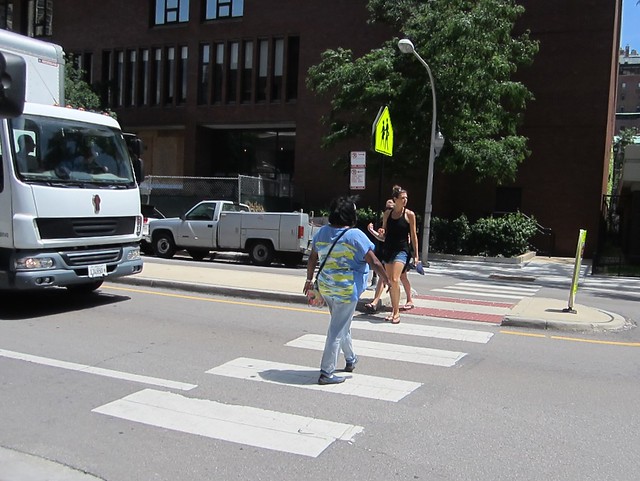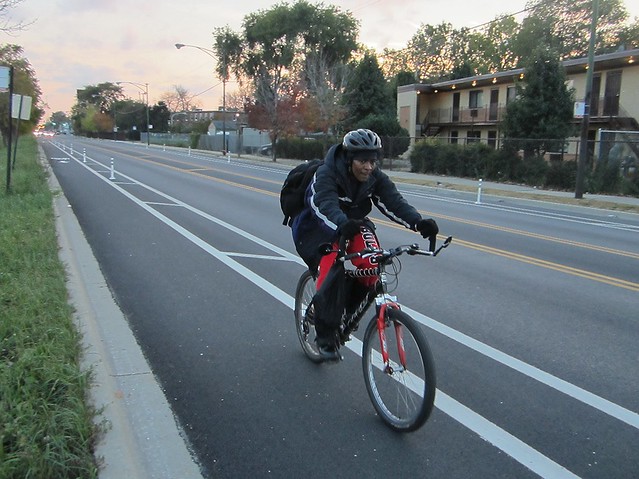
The Active Transportation Alliance released its 2015 election platform last week [PDF], featuring strategies to improve walking, biking, and transit in the region that they want candidates in the municipal elections to endorse. The Active Transportation Platform focuses on creating safer streets and providing better infrastructure for pedestrians, cyclists, and transit riders. The group hopes candidates will pledge to take action to reduce the number of pedestrian and bike fatalities in Chicago, increase transit funding, and address other key transportation challenges.
There are 198 people running for alderman in 46 Chicago wards, according to the website Aldertrack, and at least four people are running for mayor. Active Trans plans to send a questionnaire [PDF] about the platform to every candidate. Hopefuls from the 43rd Ward will also receive a questionnaire [PDF] from the group BikeWalk Lincoln Park, which asks about the candidates ideas for making Clark Street safer and more vibrant, among other topics.
Active Trans based the questions on discussions with supporters, feedback from last year's member meeting, and a public survey, according to staffer Kyle Whitehead. The first question quickly establishes the group's priorities, asking if the candidate or a family member routinely walks, bikes, or rides transit to get to work or school, to run errands, or for recreation.
The platform states that there should be a sustainable funding source to pay for pedestrian infrastructure improvements, and bike lane and crosswalk maintenance. Whitehead said this plank came out of the Safe Crossings campaign, which identified the ten most dangerous intersections in Chicago for pedestrians. "Even when the alderman, residents, and the Chicago Department of Transportation all agree that there's a problem in pedestrian movement [at an intersection], there's not always funding to develop solutions," he noted.
Each alderman has $1.3 million in discretionary "menu" funds, but "aldermen are being pulled in all directions as to where that money should go," Whitehead explained. When there's a pedestrian safety issue that needs to be addressed, there's often a lengthy back-and-forth between the alderman and CDOT about how infrastructure should be financed, which delays improvements. "Pedestrian safety is critical, to the point where there should be a portion of the city's annual budget dedicated to improving the pedestrian experience," he said.
The same thing is true for bike lane maintenance. CDOT usually only restripes bike lanes and when there's a repaving project, or when an alderman wants to pay for the restriping via menu funds. Only a handful of aldermen, all from downtown and North Side districts, have chosen to do that, which contributes to the poorer quality of the bike network on the South and West Sides. Rather than having the visibility of a bike lane depend on which ward it's passing through, dedicated funding would create a more functional citywide bikeway system for all cyclists.

The platform recommends building a total of 150 more miles of buffered and protected bike lanes (Chicago currently has 83 miles). It also calls for building high-quality bikeways on all "Spoke Routes" – including Clark, Milwaukee, Lake, Archer, State/Vincennes, and South Chicago – to the city limits.
While the platform notes that the city has already done a good job of improving the Spoke Routes, which are useful for for commuting to the Loop, it recommends creating 100 miles of "Neighborhood Routes" on low-stress, traffic-calmed side streets, connecting local destinations. Whitehead said this plank is about building a network that supports bike trips for neighborhood errands, not just work commutes.
He noted that nearly 80 percent of Chicago bike trips are non-commute trips, and many Chicagoans feel more comfortable biking on residential streets than on commercial streets. In line with the goal of making the bike network safe for those from 8 to 80, Active Trans also wants to see neighborhood slow zones, with lower speed limits and traffic calming infrastructure.
The platform also calls for more in-person and camera enforcement of traffic laws. That includes more outreach events at dangerous pedestrian crossings to inform motorists about the law requiring them to stop for people in crosswalks.
Ideally, Whitehead said, there would be paid police officers present at these intersections, "to ascribe a penalty as quickly as possible ... because the level of compliance is not anywhere near where we want it." But that requires more funding. At many of the outreach events the city already conducts dozens of times a year, some officers are volunteering their time, or have to leave early, which means drivers only get a pamphlet from one of Chicago's safety ambassadors, not a ticket.
Active Trans also wants to see improvements to the CTA bus network. Bus ridership has fallen systemwide for two years, although the CTA expects ridership to stabilize as the causes of the ridership drop – mainly fare increases – become less of a factor. Speeding up bus routes is the one of best ways ways to increase transit access and ridership. The platform calls for adding as many gold-standard features to the Central Loop BRT, moving forward with Ashland BRT planning, and developing more "BRT Lite" routes like the J14 Jeffery Jump and New York's Select Bus Service.
The platform also calls for adding Metra train service within the city where demand exists. Metra service is largely about serving suburban residents working 9-to-5 on weekdays. However, many Chicagoans use it for reverse commutes and crosstown trips, and many more would if the train schedule was more convenient. To fund these bus and train improvements, Active Trans is asking candidates if they support increased investment in transit by the city of Chicago, as well as creating a dedicated funding source at the Cook County level.
Active Trans cannot endorse candidates due to its 501(c)3 nonprofit status. However, the group is urging its 7,000 members to review the platform and questionnaires before they vote on February 24.



